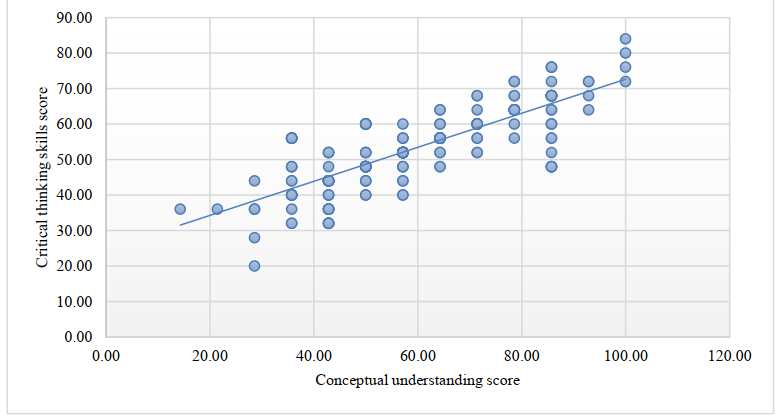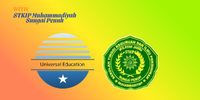Correlational Study Between Conceptual Understanding and Critical Thinking Skills of Students on Biology Materials
https://doi.org/10.63081/uejtl.v2i1.37
Correlation study, 1-dimensional kinematics, Critcal thinking, Biology
Abstract
This study aims to identify the relationship between students' understanding of biological concepts and their critical thinking skills. This research uses a quantitative approach with a correlational study design. The research was carried out in Tanjung Jabung Barat Regency, which involved a sample of 328 class XI students, who were selected using simple random sampling from a population of four selected high schools. The data was collected using two validated research instruments, namely the biology concept understanding test and the critical thinking skills test. Descriptive statistics and Pearson Product-Moment correlation were used to test the strength and direction of correlation between the two quantities. The average score for students' understanding of biology concepts was 59.32 (SD = 15.28), while the average score for critical thinking skills was 53.15 (SD = 9.20). This indicates that, on average, students still face difficulties in both aspects. The analysis results showed a significant positive correlation between students' understanding of biological concepts and their critical thinking skills (r = 0.797, p < 0.01). These findings indicate that a good understanding of biological concepts can improve students' critical thinking skills, which are essential for the development of higher-order thinking skills. The critical thinking scores are significantly explained by the students' conceptual understanding since R² = 0.635, which shows that the biological concepts comprehension could account for 63.5% of the critical thinking variance, while the other 36.5% will be due to other factors. These findings highlight the importance of understanding concepts for developing critical thinking skills. The study suggests that teaching strategies focusing on understanding the biological concepts that the students are being taught should come first for students to develop their higher-order thinking skills. Moreover, it is advisable to broaden the scope of contributing factors to encompass such issues as teaching approaches and students’ active participation in future studies. The findings offer useful information for the development of curricula, the goal of which is to integrate the conceptual understanding and critical thinking skills of those being taught biology.
References
Alsarayreh, R. S. (2021). Developing critical thinking skills towards biology course using two active learning strategies. Cypriot Journal of Educational Sciences, 16(1), 221–237. https://doi.org/10.18844/cjes.v16i1.5521
Amelia, M. A. (2024). Citizenship education in the digital era in forming critical thinking and participating through social media. International Journal of Students Education, 2(1), 298–302. https://doi.org/10.62966/ijose.v2i1.656
Anwar, Y., Permata, S., & Ermayanti. (2020). Measuring biology educations students’ critical thinking skill using online systems. Journal of Physics: Conference Series, 1480(1). https://doi.org/10.1088/1742-6596/1480/1/012068
Barbieri, M. (2012). Code Biology – A New Science of Life. Biosemiotics, 5(3), 411–437. https://doi.org/10.1007/s12304-012-9147-3
Çoban, A., & Erol, M. (2020). Influence of Problem-Based Learning on Conceptual Understanding and Critical Thinking regarding Quantum Physics. Lat. Am. J. Phys. Educ, 14(4), 1–9. https://dialnet.unirioja.es/servlet/articulo?codigo=7840892
Dessie, E., Desta, G., & and Eshetu, F. (2024). Motivation, conceptual understanding, and critical thinking as correlates and predictors of metacognition in introductory physics. Cogent Education, 11(1), 2290114. https://doi.org/10.1080/2331186X.2023.2290114
Fitriani, A., Zubaidah, S., Susilo, H., & Muhdhar, M. H. I. Al. (2020). The Correlation between Critical Thinking Skills and Academic Achievement in Biology through Problem Based Learning-Predict Observe Explain (PBLPOE). International Journal of Learning, 6(3), 170–176. https://doi.org/10.18178/IJLT.6.3.170-176
Fitriyah, I. M. N., & Ghofur, M. A. (2021). Pengembangan E-LKPD Berbasis Android dengan Model Pembelajaran Problem Based Learning (PBL) untuk Meningkatkan Berpikir Kritis Peserta Didik. Edukatif : Jurnal Ilmu Pendidikan, 3(5), 1957–1970. https://doi.org/10.31004/edukatif.v3i5.718
Hansen, B. (1999). Testing for Linearity. Journal of Economic Surveys, 13(5), 551–576. https://doi.org/https://doi.org/10.1111/1467-6419.00098
Hartatiana, Efriani, A., & Sholihin, R. (2022). Penerapan Model PAKEM (Partisipatif, Aktif, Kreatif, Efektif Dan Menyenangkan) terhadap Hasil Belajar Matematika. Jurnal of Education in Mathematics, Science, and Technology, 5(1), 18–27. https://doi.org/10.30631/jemst.v5i1.69
Ironside, M. P. (2005). Teaching Thinking and Reaching the Limits of Memorization: Enacting New Pedagogies. Journal of Nursing Education, 44(10), 441–449. https://doi.org/10.3928/01484834-20051001-02
Jeronen, E., Palmberg, I., & Yli-Panula, E. (2017). Teaching methods in biology education and sustainability education including outdoor education for promoting sustainability—a literature review. In Education Sciences (Vol. 7, Issue 1, pp. 1–19). https://doi.org/10.3390/educsci7010001
Mahanal, S., Tendrita, M., Ramadhan, F., Ismirawati, N., & Zubaidah, S. (2019). The Analysis of Students’ Critical Thinking Skills on Biology Subject. Anatolian Journal of Education, 2(2). https://doi.org/10.29333/aje.2017.223a
Malagola, Y., Supartinah, Atmojo, S. E., & Senen, A. (2023). Analysis of Critical Thinking Ability and Understanding of Basic Science Concepts in Primary School Teacher Education Students. Jurnal Penelitian Pendidikan IPA, 9(12), 10619–10624. https://doi.org/10.29303/jppipa.v9i12.4149
Moustahfir, S., & Brigui, H. (2024). Navigating Critical Thinking in the Digital Era: An Informative Exploration. International Journal of Linguistics, Literature and Translation (IJLLT), 7(1), 137–143. https://doi.org/10.32996/ijllt.2024.7.1.11x
Muhardi. (2004). Kontribusi Pendidikan dalam Meningkatkan Kualitas Bangsa Indonesia. Mimbar, XX(4), 478–492. https://doi.org/10.29313/mimbar.v20i4.153
Nur, A., Safitri, R., & Prasi, I. G. N. (2024). Analysis of the Correlation Between Learning Motivation and Critical Thinking Skills of Students on the Subject of Particle Dynamics. UEJTL: Universal Education Journal of Teaching and Learning, 1(1), 18–24. https://doi.org/10.63081/uejtl.v1i1.30
Putri, A., Soesilawati, S. A., & Diani, N. (2024). Problem-Based Learning in Improving Student Learning Outcomes in Biology Learning. UEJTL: Universal Education Journal of Teaching and Learning, 1(2), 50–56. https://doi.org/10.63081/uejtl.v1i2.36
Ratnawati, D., Handayani, I., & Hadi, W. (2020). Pengaruh Model Pembelajaran Pbl Berbantu Question Card Terhadap Kemampuan Berpikir Kritis Matematis Siswa Smp. Edumatica : Jurnal Pendidikan Matematika, 10(01), 44–51. https://doi.org/10.22437/edumatica.v10i01.7683
Safitri, A. O., Yunianti, V. D., & Rostika, D. (2022). Upaya Peningkatan Pendidikan Berkualitas di Indonesia: Analisis Pencapaian Sustainable Development Goals (SDGs). Jurnal Basicedu, 6(4), 7096–7106. https://doi.org/10.31004/basicedu.v6i4.3296
Snyder, L. G., & Snyder, M. J. (2008). Teaching Critical Thinking and Problem Solving Skills. The Delta Pi Epsilon Journal, L(2), 90–100.
Styers, M. L., Van Zandt, P. A., & Hayden, K. L. (2018). Active learning in flipped life science courses promotes development of critical thinking skills. CBE Life Sciences Education, 17(3), 1–13. https://doi.org/10.1187/cbe.16-11-0332
Tanner, K., & Allen, D. (2005). Approaches to biology teaching and learning: Understanding the wrong answers-teaching toward conceptual change. Cell Biology Education, 4(SUMMER), 112–117. https://doi.org/10.1187/cbe.05-02-0068
Taqwa, M. R. A., Faizah, R., & Rivaldo, L. (2019). Pengembangan Lembar Kerja Mahasiswa Berbasis POE dan Kemampuan Berpikir Kritis Mahasiswa pada Topik Fluida Statis. Edufisika: Jurnal Pendidikan Fisika, 4(1), 6–13. https://doi.org/10.22437/edufisika.v4i01.6284
Taqwa, M. R. A., & Rivaldo, L. (2019). Pembelajaran Problem Solving Terintegrasi PhET: Membangun Pemahaman Konsep Listrik Dinamis. Kwangsan: Jurnal Teknologi Pendidikan, 7(1), 45–56. https://doi.org/10.31800/jtp.kw.v7n1.p45--56
Tekkaya, C., Özkan, Ö., & Sungur, S. (2001). Biology concepts perceived as difficult by turkish high school students. Hacettepe Üniversitesi Eğitim Fakültesi Dergisi, 21(21). https://dergipark.org.tr/tr/pub/hunefd/issue/7817/102689
Umstead, L. K., & Mayton, H. (2018). Using correlational and causal-comparative research designs in Practice: Exploring relations among client variables. In Making research relevant (pp. 95–108). Routledge.
Wahyuningtyas, R. S., & Wuryadi. (2021). the Influence of Contextual Teaching and Learning To Improve Students. AIP Conf. Proc., 080009(2018). https://doi.org/10.1063/1.5062828
Wardyaningrum, A. R., & Suyanto, S. (2019). Improving Students’ Conceptual Understanding of Biology through Quipper School. Journal of Physics: Conference Series, 1233(1). https://doi.org/10.1088/1742-6596/1233/1/012001
Willingham, D. T. (2008). Critical Thinking: Why Is It So Hard to Teach? Arts Education Policy Review, 109(4), 21–32. https://doi.org/10.3200/AEPR.109.4.21-32
Wulandari, A. Y. R. (2018). Correlation between critical thinking and conceptual understanding of student’s learning outcome in mechanics concept. AIP Conference Proceedings, 2014(September). https://doi.org/10.1063/1.5054432
Yulianti, E., & Gunawan, I. (2019). Model Pembelajaran Problem Based Learning )PBL: Efeknya terhadap Pemahaman Konsep dan Berpikir Kritis. Indonesian Journal of Science and Mathematics Education, 2(3), 399–408. https://doi.org/10.24042/IJSME.V2I3.4366

Downloads
Published
How to Cite
Issue
Section
License
Copyright (c) 2025 Bambang Rismanto, Muhammad Aqillul Hayat

This work is licensed under a Creative Commons Attribution-NonCommercial 4.0 International License.







